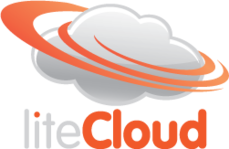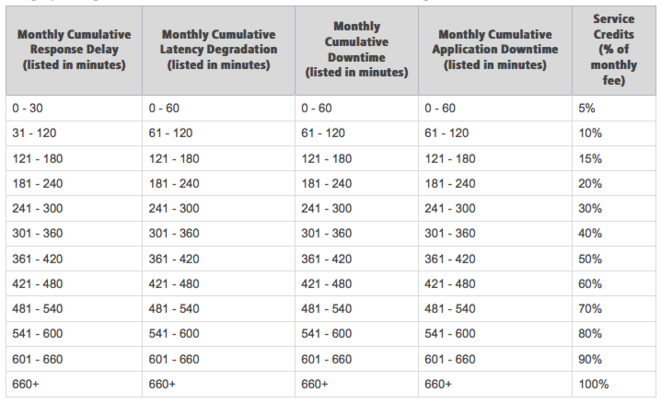

LiteCloud Cloud Hosting SLA
As part of the LiteCloud Cloud Hosting Terms of Services Agreement that governs Customer's purchase of services from LiteCloud, LiteCloud will meet the service level agreements set forth below.
100% Network Uptime Standard
For all geographic regions, LiteCloud intends to provide 100% availability of the LiteCloud Cloud Network. The LiteCloud Cloud Network is comprised of the border routers, firewalls, load balancers, and switches. For purposes of this SLA, the uptime does not include the dedicated Customer systems or Operating System layer. The LiteCloud Cloud Network will be deemed 'available' if the networking components are available and responding to LiteCloud monitoring tools as designed and in a non-degraded manner (as evidenced in the LiteCloud monitoring tool).
99.95% Server Uptime
For Cloud Servers deployed in the all geographic regions, LiteCloud intends to provide 100% availability of individual servers within the LiteCloud Cloud environment. For purposes of this SLA, only failures due to hardware and hypervisor layers delivering individual servers are covered. The individual server will be deemed 'available' if the virtualization hardware and hypervisor layers delivering individual servers are available and responding to LiteCloud monitoring tools as designed and in a non-degraded manner (as evidenced in the LiteCloud monitoring tool).
60 Minute Support Response Time Guarantee
The LiteCloud Support personnel intends to review and update any Case submitted via the LiteCloud Community within 60 minutes for EMERGENCY Cases and within 4 Hours for all other cases. EMERGENCY Cases are considered any Case where a server is down and unavailable. LiteCloud may reclassify, at its sole discretion, any Case misclassified as an Emergency Case, and such Case will not qualify for EMERGENCY treatment. Resolution and repair times vary, and therefore not covered under this SLA.
<1 ms Latency Guarantee
LiteCloud intends to provide a latency of less than 1 ms for the transfer of data packets from one server to another within the LiteCloud Cloud environment and within the same network (VLAN). Latency measurements are based on LiteCloud standard monitoring systems. Latency between separate networks (VLAN's) are not covered under this SLA.
Service Credit Calculation
In the event of a failure to meet the Network Uptime Standard, Server Uptime, or Application Uptime Standard (if applicable), the duration of such failure period will be considered downtime. In the event of failure to meet the Support Response Time, the duration of time beyond the allotted response time shall be considered response delay. In the event of failure to meet the Latency, the duration of time with latency equal to or exceeding 1 ms shall be considered latency degradation.
Credits Based on the Following Metrics
As part of the LiteCloud Cloud Hosting Terms of Services Agreement that governs Customer's purchase of services from LiteCloud, LiteCloud will meet the service level agreements set forth below.
100% Network Uptime Standard
For all geographic regions, LiteCloud intends to provide 100% availability of the LiteCloud Cloud Network. The LiteCloud Cloud Network is comprised of the border routers, firewalls, load balancers, and switches. For purposes of this SLA, the uptime does not include the dedicated Customer systems or Operating System layer. The LiteCloud Cloud Network will be deemed 'available' if the networking components are available and responding to LiteCloud monitoring tools as designed and in a non-degraded manner (as evidenced in the LiteCloud monitoring tool).
99.95% Server Uptime
For Cloud Servers deployed in the all geographic regions, LiteCloud intends to provide 100% availability of individual servers within the LiteCloud Cloud environment. For purposes of this SLA, only failures due to hardware and hypervisor layers delivering individual servers are covered. The individual server will be deemed 'available' if the virtualization hardware and hypervisor layers delivering individual servers are available and responding to LiteCloud monitoring tools as designed and in a non-degraded manner (as evidenced in the LiteCloud monitoring tool).
60 Minute Support Response Time Guarantee
The LiteCloud Support personnel intends to review and update any Case submitted via the LiteCloud Community within 60 minutes for EMERGENCY Cases and within 4 Hours for all other cases. EMERGENCY Cases are considered any Case where a server is down and unavailable. LiteCloud may reclassify, at its sole discretion, any Case misclassified as an Emergency Case, and such Case will not qualify for EMERGENCY treatment. Resolution and repair times vary, and therefore not covered under this SLA.
<1 ms Latency Guarantee
LiteCloud intends to provide a latency of less than 1 ms for the transfer of data packets from one server to another within the LiteCloud Cloud environment and within the same network (VLAN). Latency measurements are based on LiteCloud standard monitoring systems. Latency between separate networks (VLAN's) are not covered under this SLA.
Service Credit Calculation
In the event of a failure to meet the Network Uptime Standard, Server Uptime, or Application Uptime Standard (if applicable), the duration of such failure period will be considered downtime. In the event of failure to meet the Support Response Time, the duration of time beyond the allotted response time shall be considered response delay. In the event of failure to meet the Latency, the duration of time with latency equal to or exceeding 1 ms shall be considered latency degradation.
Credits Based on the Following Metrics

If the Customer is on a service plan in the month of the outage, the Service Credit percentage will apply to the Cloud service plan's monthly fee for the geographic region in which the downtime occurred, and will not include any overages. If the Customer is on a Cloud pay as you go plan and actively using the system during the downtime, the Service Credit percentage will apply to the previous month's invoiced amount for usage in the geographic region in which the downtime occurred. At no time will the Service Credit percentage exceed the Cloud product monthly fee.
LiteCloud will issue the Customer a credit which will be applied to the invoice in the month following the applicable event. Service Credits must be requested in writing to cloudcredit@litecloudhosting.com, within 30 days of the qualifying event. Service credits are accumulated monthly with all SLA metrics being reset at the beginning of each calendar month.
LiteCloud monitoring/ticketing systems shall be the information source of record for the accumulation of Monthly Cumulative.
Definitions
LiteCloud will issue the Customer a credit which will be applied to the invoice in the month following the applicable event. Service Credits must be requested in writing to cloudcredit@litecloudhosting.com, within 30 days of the qualifying event. Service credits are accumulated monthly with all SLA metrics being reset at the beginning of each calendar month.
LiteCloud monitoring/ticketing systems shall be the information source of record for the accumulation of Monthly Cumulative.
Definitions
- Scheduled Maintenance Window: Unless categorized as an emergency maintenance window, LiteCloud follows a weekly maintenance schedule to be announced by LiteCloud Operations.
- Scheduled Downtime: Scheduled time to perform routine, non-emergency or emergency maintenance on Hardware, Software or related equipment.
- Downtime: Time that the system is not available which is not Scheduled Downtime or Scheduled Maintenance Window.
- Latency: Amount of time it takes for a packet of data to travel from one point to another.
SLA Exemptions
The following items or situations are exempt from LiteCloud's availability:
- Unavailability of Customer's Cloud System during scheduled maintenance window, emergency maintenance or any other agreed-to scheduled downtime activity.
- In the event of downtime which qualifies for Monthly Cumulative Downtime credits, a customer will not be eligible for any service credits associated with Latency Degradation during such downtime.
- Downtime that resulted from modifications or changes of the operating system, database, application code or other customer code, not provided by LiteCloud.
- Attacks (i.e. hacks, denial of service attacks, viruses) by third parties, and other acts not caused by LiteCloud, provided that LiteCloud makes every reasonable effort to maintain current versions of software patches.
- Events of force majeure, including acts of war, god, earthquake, flood, embargo, riot, sabotage, labor dispute (outside of LiteCloud's own employees), government act, or failure of the Internet.
- If LiteCloud is providing Application Operations to Customer:
- Modifications to hardware, system applications or application code configuration, or code not authorized by LiteCloud. Changes or modifications to code that contributed to downtime.
- Unavailability of Customer's System due to Customer programming, modifications to OS, content, development, staging and/or testing period(s) or acts or omissions of Customer which are not performed in accordance with LiteCloud's standard change control processes.
- Unavailability of Customer System caused by failures of third party systems or services that are not under LiteCloud's control.
Customer must be current on all outstanding invoices (as defined in the Terms of Service) to be eligible for the credits referenced in this SLA. No credits will be extended if Customer is delinquent in its payment of outstanding invoices






